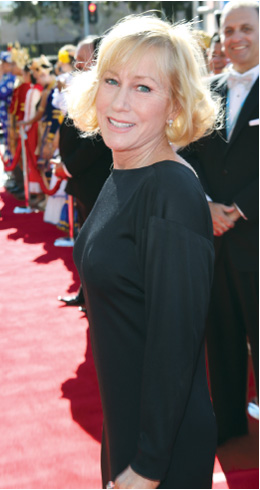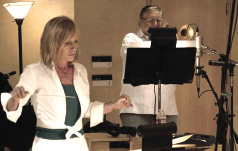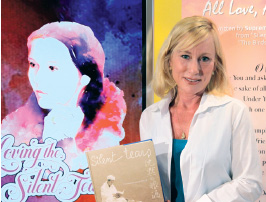IN-DEPTH
WITH THE ARTISTS
AND CREATIVE TEAM |
||||||||||||||
|
In-Depth with Loving
the Silent Tears
She has been called the “best-kept secret in Hollywood,” “master of less is more,” and “a storyteller without words.” Grammy winner and seven-time Emmy nominee Nan Schwartz is also lauded as a pioneer of women composers. Ms. Schwartz, who first pursued a career in television production, later began private studies to achieve her secret ambition: film scoring. Utilizing her lifelong devotion to music and her experience studying piano and singing professionally, she has accomplished a very successful career that has included scoring and/or orchestrating music for countless memorable films and television series, such as In the Heat of the Night, The Curious Case of Benjamin Button, Harry Potter and The Deathly Hollows, Part 1, and Uptown Girls. Other highlights include Grammy-nominated arrangements for John Williams and the Boston Pops Orchestra, Ray Charles, famous jazz musicians, and more. Among her many accolades is a Grammy Award for her arrangements for Natalie Cole. Ms. Schwartz has made a unique mark in all musical venues – themes, songs, episodic television, and film. She has earned a sterling reputation as a world-class composer.
Following is an excerpt from Supreme Master TV’s interview with Ms. Schwartz about her thoughts on her music, career, and involvement with Loving the Silent Tears as one of the esteemed composers. Q: You’ve had a lifelong devotion to music that partly comes from both your parents; both of them were accomplished musicians. They worked with Frank Sinatra, Tommy Dorsey, Judy Garland, Henry Mancini, Sonny and Cher, for example. Musically, who have influenced you the most in your career as a composer? Nan Schwartz: At a very early age, I was doing a lot of singing as a child, and I was called to do a television show with this new composer from France. His name was Michel Legrand and he wrote “Umbrellas of Cherbourg” and many other beautiful songs. And he gave me a sense of harmony and melody that I think is still with me today in my music. Q: You are one of the illustrious composers writing the music for the new musical, Loving the Silent Tears. How do you feel about being part of this exciting new production? Nan Schwartz: The Supreme Master was new to me, and her teachings and her philosophies. But as I delved into her lyrics, I realized I was part of some large force of positive and goodness in the world. This is the coming together of music in the name of a good purpose, a higher purpose, a spiritual purpose, and I am always seeking films that have a higher purpose, that bring out the best in people, that have a good message. And it’s hard to find projects that are this way, because commercial music and commercial films and commercial television sometimes don’t dwell on these realms of spirituality or positiveness. This project really did. And it was a way for me to bring my philosophy and my gratitude for my life in a project that could use my talents. It was a great symbiosis.
Q: Can you tell us about the music that you’re composing for Loving the Silent Tears? Nan Schwartz: Each piece that I wrote for Loving the Silent Tears was written for a different part of the world. One was for Ireland, one was for France, and one was for Africa. And so each was a different challenge to try to write music that encapsulates the flavor of the country, utilizing the Supreme Master’s lyrics. So, I wanted to bring some form and some architecture to the song so that the melodies would be memorable and people could relate to them and maybe subconsciously hum them later or think about them or like them. The Ireland piece, I used a Celtic harp and a tin whistle and the voice that I’m writing for is a very high voice, à la (in the style of) Enya. And the African voice is Jody Watley, and that’s got three back-up singers to be a chorus to sort of support her in their singing and using African percussion. And the France piece, I used an accordion in that, and the lyrics, they start sort of downbeat and questioning and then they turn into something triumphant and big. I decided to make that into sort of a big moment and that became kind of a Broadway-esque kind of piece. Q: What process do you go through to create the music? Nan Schwartz: At times I would find a structure and start singing in my head how I thought the words would rhythmically go, and then I could find a melody that went with that. And then from there, I could develop a harmony behind it and develop chords. And of course, knowing that I was going to incorporate these ethnic instruments into the piece, I had them on my synthesizer palette to play with. And so, I could put a background in and then kind of sing over that and work from there.
Q: I read that a composer’s real job is to try to bring emotion to life through music. Did you have to do this for Loving the Silent Tears? Nan Schwartz: With these poems, there was plenty of emotion built into the lyrics because they’re all very emotional in terms of their content and in terms of their speaking to a higher power about how she or he feels. One of them is “Accept Me the Way I Am” which was written for France. That was quite emotional because the lyrics are pleading with this force, “You’ve given me so many tasks to deal with and I’m so challenged. And please accept me,” and the emotion is right there. “Accept Me the Way I Am” was the last song which I tackled, and so perhaps it’s the strongest emotionally, because the engines were running and all revved up by the time I got to that song. But the lyrics themselves are very passionate. They say, “O Master of heaven and earth / Lord of infinite Love / High above all sorrows and pleasures / You own my very heart!” That is such a beautiful message that we all feel, and I feel personally. “Wouldn’t You accept me the way I am / Your hard tests are difficult to pass!” There are life challenges all the time for all of us, but in particular, this lyric is like a plea to a higher force, to accept me the way I am. And there is so much emotion in that, and it was probably the most dramatic of the three songs that I wrote. Q: Supreme Master Ching Hai has a peace slogan, which is “Be Vegan, Make Peace.” She believes that peace begins with each one of us, and that we should look at our lifestyles and bring peace to our lives by spreading peace to others, including the animals. Could you share your thoughts on peace? Nan
Schwartz: I know that everybody is going through
something, and everybody might have a reason for being difficult
to deal with out on a highway, or in a store, or in crossing
my path. Everyone has a story, and everyone’s going through
something and probably much worse than whatever I’m going
through. And so I always try to take the high road and offer
peace and love and understanding to people, and hope, so that
one little small step reverberates and is passed onto the next
person, the next person, the next person. Hopefully all of
us together being peaceful and vegan will be able to change
the world, one person at a time.
|
||||||||||||||



